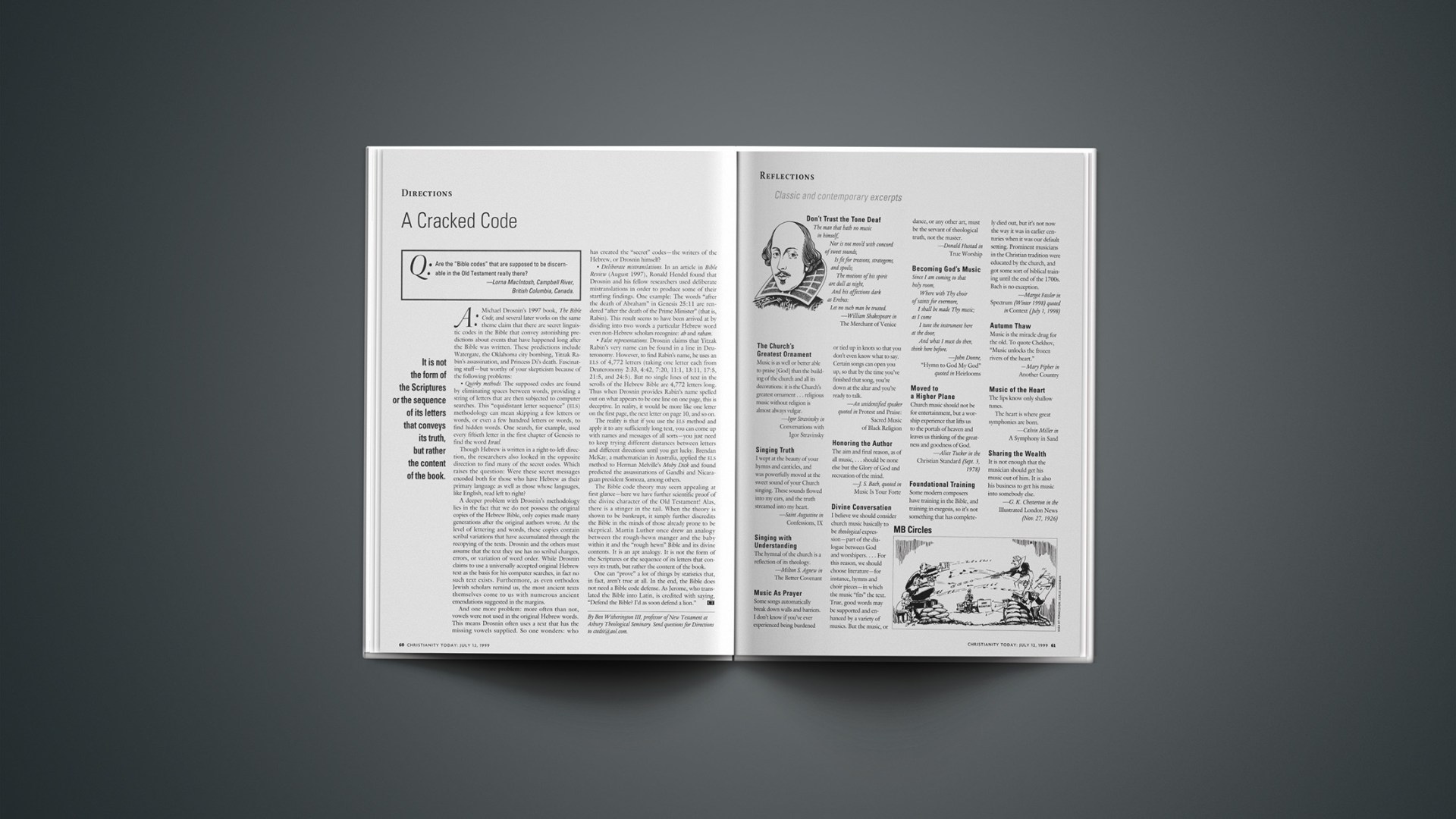Don’t Trust the Tone DeafThe man that hath no music in himself, Nor is not mov’d with concord of sweet sounds, Is fit for treasons, strategems, and spoils; The motions of his spirit are dull as night, And his affections dark as Erebus: Let no such man be trusted.
—William Shakespeare in The Merchant of Venice
The Church’s Greatest Ornament Music is as well or better able to praise [God] than the building of the church and all its decorations: it is the Church’s greatest ornament … religious music without religion is almost always vulgar.
—Igor Stravinsky in Conversations with Igor Stravinsky
Singing Truth I wept at the beauty of your hymns and canticles, and was powerfully moved at the sweet sound of your Church singing. These sounds flowed into my ears, and the truth streamed into my heart.
—Saint Augustine in Confessions, IX
Singing with Understanding The hymnal of the church is a reflection of its theology.
—Milton S. Agnew in The Better Covenant
Music As Prayer Some songs automatically break down walls and barriers. I don’t know if you’ve ever experienced being burdened or tied up in knots so that you don’t even know what to say. Certain songs can open you up, so that by the time you’ve finished that song, you’re down at the altar and you’re ready to talk.
—An unidentified speaker quoted in Protest and Praise: Sacred Music of Black Religion
Honoring the Author The aim and final reason, as of all music, … should be none else but the Glory of God and recreation of the mind.
—J. S. Bach, quoted in Music Is Your Forte
Divine Conversation I believe we should consider church music basically to be theological expression—part of the dialogue between God and worshipers. … For this reason, we should choose literature—for instance, hymns and choir pieces—in which the music “fits” the text. True, good words may be supported and enhanced by a variety of musics. But the music, or dance, or any other art, must be the servant of theological truth, not the master.
—Donald Hustad in True Worship
Becoming God’s MusicSince I am coming to that holy room, Where with Thy choir of saints for evermore, I shall be made Thy music; as I come I tune the instrument here at the door, And what I must do then, think here before.
—John Donne, “Hymn to God My God”quoted in Heirlooms
Moved to a Higher Plane Church music should not be for entertainment, but a worship experience that lifts us to the portals of heaven and leaves us thinking of the greatness and goodness of God.
—Alice Tucker in the Christian Standard (Sept. 3, 1978)
Foundational Training Some modern composers have training in the Bible, and training in exegesis, so it’s not something that has completely died out, but it’s not now the way it was in earlier centuries when it was our default setting. Prominent musicians in the Christian tradition were educated by the church, and got some sort of biblical training until the end of the 1700s. Bach is no exception.
—Margot Fassler in Spectrum (Winter 1998) quoted in Context (July 1, 1998)
Autumn Thaw Music is the miracle drug for the old. To quote Chekhov, “Music unlocks the frozen rivers of the heart.”
—Mary Pipher in Another Country
Music of the Heart The lips know only shallow tunes.
The heart is where great symphonies are born.
—Calvin Miller in A Symphony in Sand
Sharing the Wealth It is not enough that the musician should get his music out of him. It is also his business to get his music into somebody else.
—G. K. Chesterton in the Illustrated London News (Nov. 27, 1926)
Copyright © 1999 Christianity Today. Click for reprint information.










